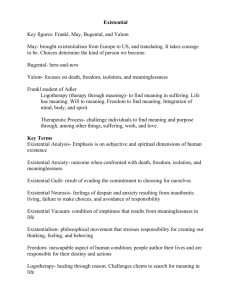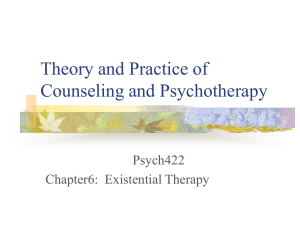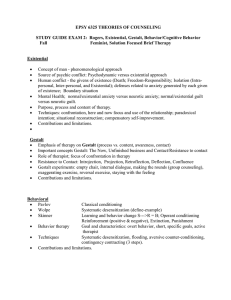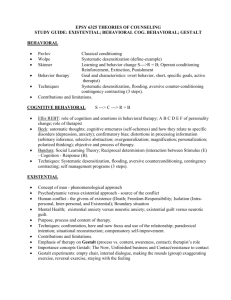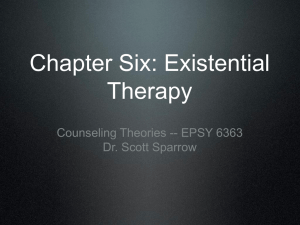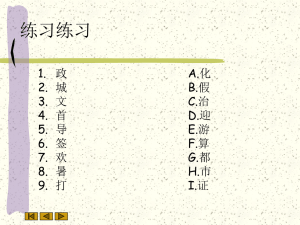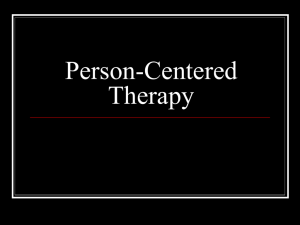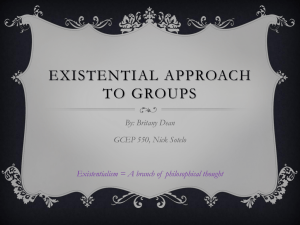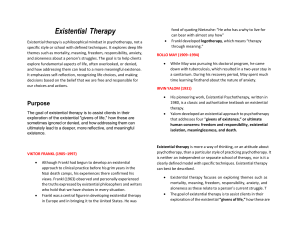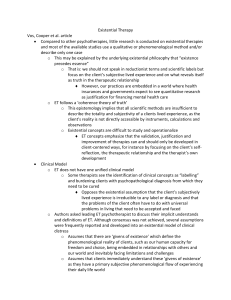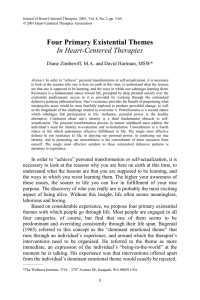Existential Therapy
advertisement
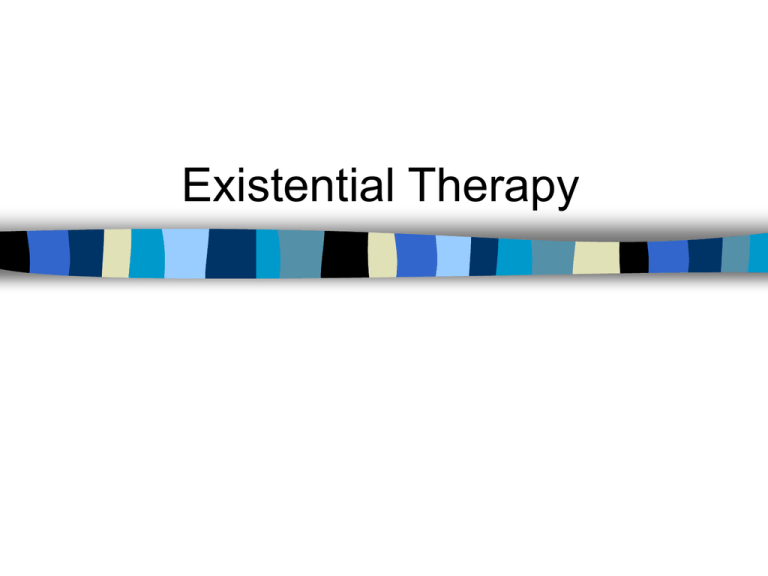
Existential Therapy View of Human Nature: people.. Have capacity for self-awareness Have freedom, responsibility, and choice Strive for identity Establish meaningful relationships Search for meaning of life View anxiety as a condition of living Are Aware of death The Capacity for Self-Awareness We can reflect and make choices because we are capable of self-awareness. Expanding our awareness by realizing that: – – – – Time is limited We have the choice to act or not to act We must search for meanings in our life We are alone Freedom, Responsibility, & Choice We are – free to choose among alternatives – responsible for our choices, lives, actions… Responsibility is not to blame others for our problems Striving for Identity Identity is “the courage to be” – We must trust ourselves to find our own answers – Our greatest fear is that there is no self Struggling with our identity: – Challenging clients---in what ways have they lost touch with their identity and instead let others to run their life. Relationship to others Aloneness – We are alone---So, we must give meaning to life, decide how we will live, have a relationship with ourselves, and learn to listen to ourselves. Relatedness – We need to create a close relationship with others – Challenging clients----What do they get from their relationships? How do they avoid close relationships? The Search for Meaning Therapists’ trust is important in teaching clients to trust their own capacity to find their way of being. Meaninglessness in life leads to emptiness Human beings need a sense of meaningfulness in their lives. Anxiety – A Condition of Living Anxiety arises from one’s strivings to survive. Existential anxiety is normal Awareness of Death Death provides the motivation for us – to live our lives fully – to take advantage of each opportunity to do something meaningful – to live in the present Therapeutic Goals To help clients become authentic To expand self-awareness To increase potential choices To help clients accept responsibility for their choice Therapist’s Function and Role Understand the client’s subjective world Encourage clients to accept personal responsibility When clients blame others, therapist will ask them what they have done to contribute to their situation. Client’s Experience in Therapy They are challenged to take responsibility for their decision and to take actions to change. Major themes in therapy sessions are anxiety, freedom and responsibility, isolation, death, and the search for meaning. Assist client in facing life with courage, hope, and a willingness to find meaning in life. Therapeutic Relationship Truly caring for the clients An authentic love for the clients (is nonreciprocal) Trusting clients’ potential to cope with their problems » Therapists have an authentic with themselves and are authentically open to the client Therapists share their reactions with the clients by showing genuine concern and empathy as one way of deepening the therapeutic relationship. Therapeutic techniques & procedures It is not technique-oriented The interventions are based on philosophical views about the nature of human existence Free for draw techniques from other orientations The use of therapist self is the core of therapy Research on existential therapy More studies are related to existential themes such as death and anxiety, or meaninglessness. – Purpose-in Life (PIL) Test (Crumbaugh & Henrios (1988): measuring meaninglessness. Yalom and colleagues conducted a series of research on existential group therapy Comparing with a waiting list control or no treatment group, participants in the existential group therapy showed increase in psychological functioning, increase in existential awareness, and improvements in immune functioning. From a multicultural perspective: contribution Is applicable to diverse clients who are searching for meaning of life Many similarities between Eastern thought and existential psychotherapy Existential therapy is particularly relevant for working with cross-cultural issue (Van DeurzenSmith,1988) From a multicultural perspective limitations Ignore social factors that cause human problems Even if clients change internally, they see little hope that the external realities of racism will change For many cultures, it is not possible to talk about self outside the context of the social network Many clients expect a structured and problemoriented approach instead of a discussion on philosophical questions.
